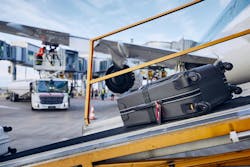Why Ground Handlers Should Utilize Data-Driven GSE Fleet Management
According to the International Air Transport Association (IATA), ground support equipment (GSE)—such as belt loaders, cargo loaders and passenger boarding bridges (PBBs)—are responsible for nearly 40 percent of apron incidents. This highlights the need for smarter, data-driven fleet management to improve safety and efficiency.
That is why managing GSE presents significant challenges. With the increasing demands of global air travel, optimizing GSE operations has become critical to reducing delays and minimizing emissions.
AI-Driven GSE Optimization
INFORM, a software provider specializing in AI-powered optimization, is at the forefront of revolutionizing GSE management in collaboration with HiSERV, a premier GSE service provider. HiSERV owns and maintains a fleet of more than 5,000 units, starting from motorized pushback tractors and belt loaders to non-motorized dollies, (electric) ground power units and other GSE. The solution for this AI optimization is SmartFLEET, offered by HiSERV using INFORM’s powerful GroundFleet module.
SmartFLEET collects telemetry data such as positions, operating hours and tank levels. It utilizes this data to calculate usage behavior and maintenance requirements. The result is displayed on intuitive dashboards.
By utilizing artificial intelligence (AI), SmartFLEET turns raw data into actionable insights, helping operators optimize the use of their GSE. This data-driven approach enables users to monitor their fleet in real time, allowing for smarter decision-making.
Streamlined Maintenance and Real-Time Monitoring
Efficient maintenance is at the core of GSE management. By leveraging INFORM’s GroundFleet solution, SmartFLEET automates the tracking of work orders, assigns tasks to mechanics and monitors progress in real time, ensuring repairs are completed promptly and reducing equipment downtime.
SmartFLEET offers an interface to a workshop system, which takes over the tasks described. The system also tracks spare parts and supplies, ensuring that necessary components are available when repairs are required.
Additionally, SmartFLEET provides real-time visibility into GSE usage, enabling ground handlers to track the performance of each piece of equipment. This data thus allows operators to optimize the deployment of their fleet and to adjust their resource strategies in a manner that will improve operational efficiency. By analyzing equipment usage patterns and downtime, ground handlers can make data-driven decisions to better manage their fleets and reduce costs.
The predictive maintenance features of SmartFLEET allows it to prevent equipment failures before they occur. This reduces downtime, prevents costly breakdowns, and keeps operations running smoothly. In conjunction with INFORM's RealTime Scheduling module, routine maintenance tasks are automatically scheduled to ensure timely maintenance and reduce the likelihood of unexpected breakdowns.
Vendor Independence
The software's hardware independence, or vendor agnosticism, allows it to collect data from various technologies and seamlessly integrate with different types of GSEs, whether motorized or non-motorized, indoor or outdoor. This vendor neutrality empowers its customers to avoid being restricted to a single GSE provider. This represents a significant advantage, as traditional telemetry systems often focus solely on their own GSE and cannot integrate with units from other vendors.
By gathering data from multiple sources, SmartFLEET enables operators to identify inefficiencies and optimize fleet performance. For instance, it can highlight underutilized equipment, allowing ground handlers to adjust how resources are deployed. This not only reduces operating costs but also extends the life of the equipment by preventing overuse. HiSERV makes the data and analysis available to their customers. They receive reports that are based on HiSERV's expertise and insights. The result is a smart fleet management system that can be used directly and requires no further infrastructure or configuration.
Sustainability and Data-Driven Resource Optimization
Sustainability is a growing priority in the aviation industry, and INFORM’s software plays a key role in promoting greener ground operations. SmartFLEET helps reduce emissions by optimizing the use of GSE, minimizing idle times, and cutting unnecessary fuel consumption. This contributes to more environmentally friendly operations, helping airports and airlines meet their sustainability goals.
INFORM’s and HiSERV’s joint solution also supports the transition to more sustainable energy sources for GSE. With many airports and airlines moving towards electrification, SmartFLEET can track and compare the performance of different types of equipment, such as electric, diesel, and hydrogen-powered GSE. This data-driven approach allows operators to make well-informed decisions regarding the best combination of equipment for their needs, balancing efficiency with sustainability.
GSE Pooling
One of the most innovative developments in GSE management is GSE pooling. In this model, multiple ground handlers share a pool of GSE, reducing the overall number of units required and lowering both acquisition and maintenance costs. Rather than each company running its own fleet, a shared pool of equipment is centrally managed and available for use as needed.
This approach has the potential to significantly reduce costs and improve efficiency, particularly in busy airport environments. GSE pooling reduces the need for storage space on the apron, freeing up valuable real estate and streamlining ground operations. Furthermore, by centralizing resources, airports can also reduce redundancy and ensure equipment is used efficiently, thereby lowering environmental impact.
Simulations and data gathered through SmartFLEET help airports evaluate the feasibility of GSE pooling before implementation. By analyzing usage patterns, operators can determine the optimal fleet size and composition, ensuring the system meets demand without causing delays or bottlenecks.
The Flexibility of Pay-Per-Use Models
Looking further into the future, INFORM’s technology could even enable the introduction of pay-per-use business models for GSE. Instead of making large capital investments, ground handlers can rent equipment based on their operational needs, paying only for the time and resources they use. This flexible model allows them to adjust their fleet size according to demand, ensuring they have the right amount of equipment without overspending.
With detailed usage tracking and real-time data analysis, SmartFLEET calculates the exact costs of GSE usage with INFORM’s GroundFleet algorithms, giving ground handlers full transparency over their expenses. This makes it easier to manage budgets and plan for future growth, while avoiding the inefficiencies of owning underutilized equipment.
A Vision for the Future of AI in GSE Management
Looking even further ahead, AI holds immense potential to further revolutionize GSE management. As systems such as SmartFLEET continue to gather and analyze more structured data, the next frontier could be the development of autonomous GSE.
With AI driving decision-making and automating tasks, we could see GSE units that operate independently, performing routine ground handling activities with minimal human intervention. These new units could be fully integrated into an existing system, which makes it possible to efficiently test autonomous vehicles and enable a smooth transition.
Autonomous GSE could improve safety, reduce human error and significantly cut operational costs. AI-driven autonomous vehicles could handle tasks such as towing, loading and unloading with precision, thereby reducing turnaround times and improving overall efficiency.
Additionally, AI will continue to enhance sustainability efforts by optimizing the use of GSE resources. Advanced algorithms will allow ground handlers to reduce idle times, minimize fuel consumption, and make smarter decisions about fleet deployment. This increased efficiency will contribute to lowering emissions and advancing the aviation industry’s environmental goals.
The Future of GSE: Sustainable, Autonomous and Intelligent
As AI-powered solutions like SmartFLEET evolve, the aviation industry will continue to benefit from increased operational efficiency, cost savings and sustainability.
The future of GSE management will be shaped by three factors: autonomous driving, optimized resource utilization and pay-per-use business models. INFORM’s AI-driven technology is paving the way for a smarter, more sustainable aviation industry.
About the Author

Alexander Wendorff
Alexander Wendorff is a Solution Manager at INFORM GmbH, where he has served for almost 24 years. His role in assisting the company’s aviation clients encompasses a wide range of skills from project management and process improvement to business strategy and logistics. He has been instrumental in numerous successful optimization software solution roll-outs.
